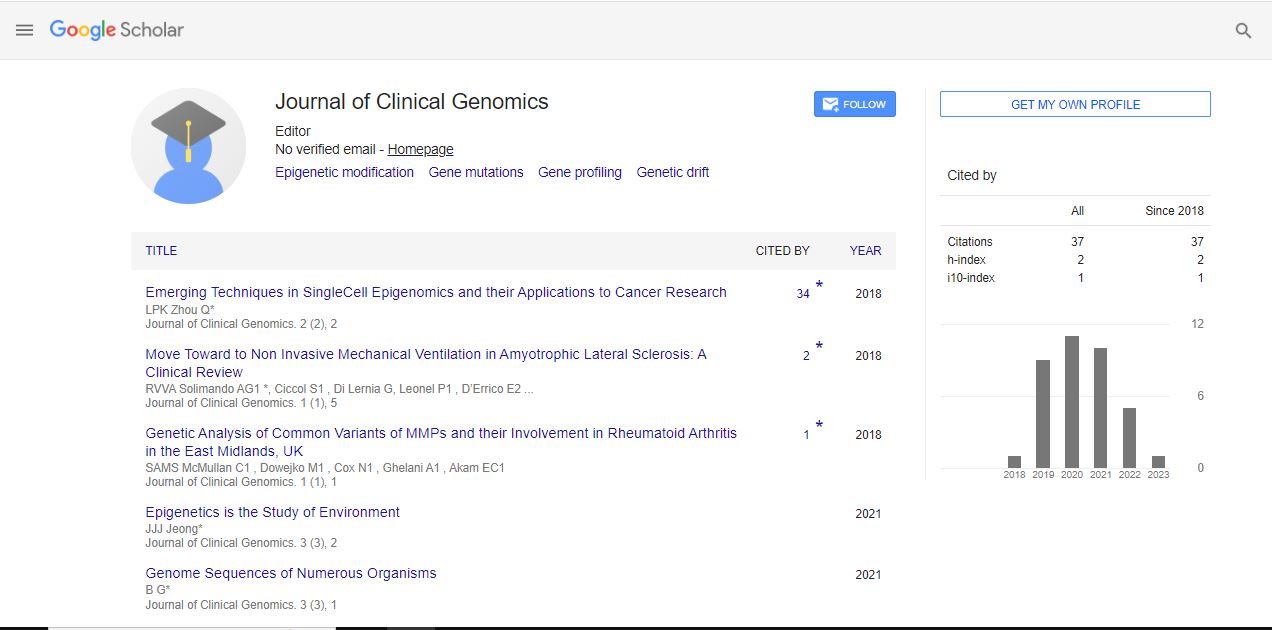Commentary, J Chromatography Res Vol: 6 Issue: 3
Analytical Chromatography: Enhancing Scientific Understanding and Industrial Applications
Heing Chen*
1Department of Bio-Chemistry, University of Illinois at Chicago, Chicago, USA
*Corresponding Author: Heing Chen,
Department of Bio-Chemistry, University of
Illinois at Chicago, Chicago, USA
E-mail: chenheing@gmail.com
Received date: 05 September, 2023, Manuscript No. JCGR-23-116808;
Editor assigned date: 07 September, 2023, PreQC No. JCGR-23-116808 (PQ);
Reviewed date: 21 September, 2023, QC No. JCGR-23-116808;
Revised date: 29 September, 2023, Manuscript No. JCGR-23-116808 (R);
Published date: 06 October, 2023 DOI: 10.36648/JCGR.1000068.
Citation: Chen H (2023) Analytical Chromatography: Enhancing Scientific Understanding and Industrial Applications. J Chromatography Res 6:3.
Description
Analytical chromatography is a powerful and versatile technique that plays a fundamental role in the field of analytical chemistry. It involves the separation, identification, and quantification of individual components within a mixture, making it an indispensable tool in various scientific disciplines, from chemistry and biochemistry to environmental science and pharmaceutical research.
Principles of analytical chromatography
Analytical chromatography relies on the fundamental principle of differential partitioning, wherein a sample is separated into its individual components based on their varying affinities for two immiscible phases:
Stationary phase: The stationary phase is typically a solid or liquid support that provides the matrix for separation. It can take various forms, such as a packed column in Gas Chromatography (GC), a solid support in High-Performance Liquid Chromatography (HPLC), or a thin layer on a solid support in Thin-Layer Chromatography (TLC). The properties of the stationary phase are carefully chosen to interact selectively with the analytes of interest.
Mobile phase: The mobile phase is a fluid that carries the sample through the stationary phase. In GC, the mobile phase is an inert gas like helium, while in HPLC, it is typically a liquid solvent. The choice of mobile phase depends on the analytical method and the properties of the sample.
The separation process in chromatography is achieved through the differential distribution of the sample components between the stationary and mobile phases. Analytes with a higher affinity for the stationary phase will spend more time interacting with it and, consequently, will take longer to traverse the column or plate, resulting in separation.
Types of analytical chromatography
Analytical chromatography encompasses several techniques, each tailored to specific applications and analytical needs. The key types include:
Gas Chromatography (GC): In GC, the sample is vaporized and injected into a column packed with a stationary phase. The mobile phase, an inert gas, carries the vaporized analytes through the column. GC is highly effective for separating volatile compounds and is widely used in environmental analysis, food safety, and drug testing.
High-Performance Liquid Chromatography (HPLC): HPLC employs a liquid mobile phase under high pressure to separate analytes. It is versatile and can handle a broad range of sample types, making it a staple in pharmaceutical, clinical, and biochemical analyses.
Liquid Chromatography-Mass Spectrometry (LC-MS): LC-MS combines liquid chromatography with mass spectrometry, allowing for the separation and identification of compounds. It is an indispensable technique in the analysis of complex mixtures and is widely used in proteomics, metabolomics, and drug discovery.
Thin-Layer Chromatography (TLC): TLC involves spotting a sample on a thin layer of stationary phase, typically coated on a glass or plastic plate. As the mobile phase ascends the plate, it separates the sample components. TLC is often used for quick qualitative analyses, particularly in organic chemistry laboratories.
Applications of analytical chromatography
Analytical chromatography finds applications in various scientific and industrial fields, with some notable examples including:
Pharmaceuticals: Chromatography is integral in drug development, quality control, and regulatory compliance. It ensures the purity and potency of pharmaceutical compounds and helps identify and quantify impurities.
Environmental analysis: Chromatographic techniques are used to detect and quantify pollutants, contaminants, and toxins in environmental samples. They play a crucial role in monitoring air and water quality and ensuring compliance with environmental regulations.
Clinical diagnostics: In clinical laboratories, chromatography is employed for the analysis of biological samples such as blood, urine, and tissues. It aids in the diagnosis and monitoring of diseases, including diabetes, drug abuse, and metabolic disorders.
Food and beverage industry: Chromatography is used to analyze food and beverage products for quality control, authenticity, and safety. It can detect contaminants, additives, and the presence of allergens.
Forensic science: Chromatography plays a pivotal role in forensic investigations. It is used to analyze samples from crime scenes, including drugs, toxic substances, and trace evidence.
Conclusion
Analytical chromatography is a cornerstone of modern analytical chemistry, providing invaluable insights into the composition and characteristics of diverse samples. Its versatility and applications span a wide range of scientific disciplines and industries, contributing to advancements in healthcare, environmental monitoring, food safety, and more. As technology continues to evolve, the future of analytical chromatography holds the promise of even more precise and efficient analytical methods, further expanding its impact on scientific research and industry. With a continued focus on addressing challenges and enhancing techniques, chromatography will remain a driving force in analytical science.
 Spanish
Spanish  Chinese
Chinese  Russian
Russian  German
German  French
French  Japanese
Japanese  Portuguese
Portuguese  Hindi
Hindi 